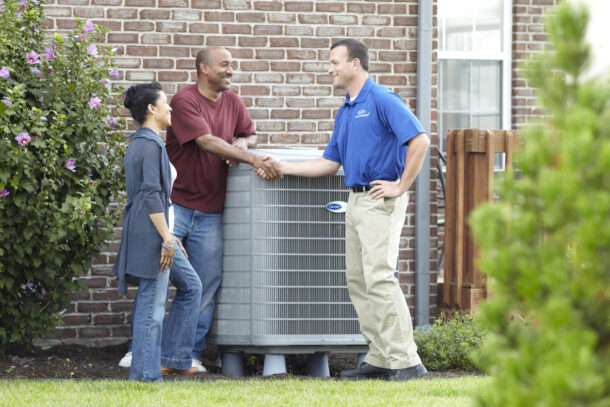Chicago, known for its windy weather and diverse seasons, demands a reliable HVAC system to keep homes comfortable year-round. If your heating, ventilation, and air conditioning (HVAC) system is showing signs of wear and tear, it might be time for a replacement. In this guide, we’ll walk you through the essential steps and considerations for a smooth HVAC replacement in the Windy City.

1. Assess Your Current HVAC System
Before diving into the replacement process, take a moment to assess your existing HVAC system. How old is it? Are you frequently calling for repairs? An aging system might be less efficient and more prone to breakdowns. If your energy bills are soaring, a newer, more energy-efficient model could be the solution.
2. Choose the Right HVAC System
Chicago experiences both frigid winters and hot summers, making it essential to select an HVAC system that can handle the extremes. Consider a system with a high Seasonal Energy Efficiency Ratio (SEER) for cooling and a high Annual Fuel Utilization Efficiency (AFUE) for heating. A knowledgeable HVAC professional can help you choose the right system based on your specific needs.
3. Research HVAC Replacement Companies
When it comes to HVAC replacement, hiring the right company is crucial. Research local HVAC replacement companies in Chicago, read customer reviews, and ask for recommendations from friends and family. A reliable company will not only provide quality installation but also offer ongoing maintenance services to keep your system running smoothly.
4. Get Multiple Quotes
When exploring HVAC replacement options, avoid settling for the initial quote. Instead, reach out to several HVAC replacement companies to gain insight into the HVAC replacement cost Chicago. While affordability is a key factor, it’s essential to strike a balance with the company’s reputation and experience. Opting for a slightly higher upfront cost from a reputable company can translate to long-term savings through efficient installation and reduced need for repairs.
5. Check for Rebates and Incentives
Many utility companies and government programs offer rebates and incentives for upgrading to energy-efficient HVAC systems. Before finalizing your decision, check for any available programs in Chicago. These incentives can significantly offset the initial cost of your HVAC replacement and contribute to long-term energy savings.
6. Schedule a Professional Assessment
Once you’ve chosen a reputable HVAC replacement company, schedule a professional assessment of your home. An experienced technician will evaluate your current system, ductwork, and insulation to determine the most suitable replacement options. This step ensures that your new HVAC system is sized correctly for optimal performance.
7. Plan for Ductwork Modifications
In older homes, ductwork may need modifications to accommodate modern HVAC systems. Leaks, inadequate insulation, or improper sizing can reduce the efficiency of your new system. Work closely with the HVAC professionals to address any ductwork issues and ensure that your replacement system operates at peak efficiency.
8. Prepare for Installation Day
On the day of installation, clear the area around your HVAC system to provide easy access for the technicians. Remove any obstacles and secure pets in a separate area to ensure a smooth and safe installation process. Communicate with the HVAC team about any specific instructions or concerns you may have.
9. Choose the Right Time for Replacement
While HVAC replacement can be done at any time of the year, it’s wise to choose a season when you won’t heavily rely on either heating or cooling. Spring or fall are often optimal times for replacement, allowing you to avoid extreme temperatures and potential discomfort during the installation process.
10. Plan for Regular Maintenance
Once your new HVAC system is in place, don’t forget about regular maintenance. Schedule annual check-ups to keep your system running efficiently and address any minor issues before they become major problems. Regular maintenance can extend the lifespan of your HVAC system and ensure consistent comfort in your Chicago home.
11. Explore Smart HVAC Options
In a tech-savvy city like Chicago, consider upgrading to a smart HVAC system. These systems allow you to control your heating and cooling remotely through a smartphone app. Smart thermostats can learn your habits, adjust settings automatically, and provide energy usage insights. While the initial cost may be slightly higher, the long-term savings and convenience make it a worthwhile investment for the modern Chicago homeowner.
12. Understand Local Building Codes
Before proceeding with your HVAC replacement, familiarize yourself with local building codes and regulations in Chicago. Different neighborhoods may have specific requirements for HVAC systems, and adherence to these codes is crucial to avoid fines or complications. Your chosen HVAC replacement company should be well-versed in local regulations and ensure that your new system meets all necessary standards.
13. Consider Zoning for Enhanced Comfort
Chicago homes often have varying temperature needs in different areas. Zoning your HVAC system allows you to control the temperature independently in different zones of your home. This not only enhances comfort but can also lead to energy savings by only heating or cooling the areas that are in use. Discuss zoning options with your HVAC professional during the replacement planning stage.
14. Plan for Contingencies
While HVAC replacement is generally a straightforward process, it’s wise to plan for contingencies. Unforeseen issues, such as hidden ductwork problems or unexpected structural challenges, can arise during the installation. Having a contingency plan in place, both in terms of time and budget, can help manage unexpected situations without causing unnecessary stress.
15. Seek Financing Options
Replacing your HVAC system is an investment in your home’s comfort and energy efficiency. If the upfront cost is a concern, explore financing options available in Chicago. Some HVAC replacement companies offer financing plans, and there may be local programs or low-interest loans that can help you spread the cost over time. Ensure you fully understand the terms and interest rates before committing to any financing arrangement.
Conclusion
Navigating the HVAC replacement process in Chicago requires careful consideration of technology, local regulations, and potential challenges. Exploring smart options, understanding building codes, and planning for contingencies can make the process smoother and more successful. By staying informed and proactive, you’ll not only enhance the comfort of your home but also contribute to a more energy-efficient and sustainable living space in the heart of Chicago. Stay warm in the winter and cool in the summer, all while being mindful of your energy consumption!




Join the conversation: